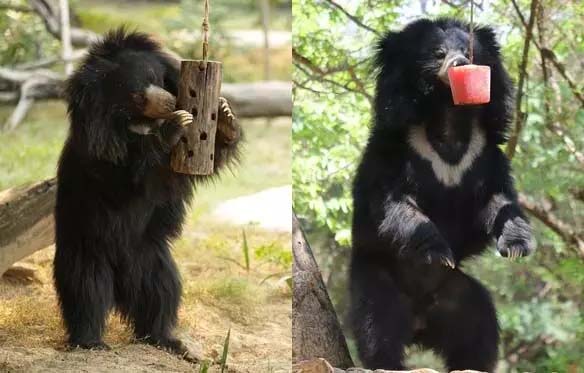Agra: Like every year all over the world, this year too World Bear Day is being celebrated on 23 March. This day is dedicated to increasing awareness and appreciation of bears around the world. 100 bears are living a peaceful and happy life in the world’s largest protected bear center located in Agra. 20 years ago their number was more than 500. Wildlife conservation organization Wildlife SOS’s dedicated team continues to provide love and care to rehabilitated sloth bears at its Agra Bear Conservation Centre. Established in the Sur Sarovar area in Taj City, it is the largest rescue and rehabilitation center for sloth bears globally. Wildlife SOS, founded in 1995, is best known for ending the cruel and barbaric practice of making bears dance on the streets for the entertainment of tourists. This tribe, known as ‘Kalandar’, used to exploit bear cubs by purchasing them from hunters. It subjected the bears to horrific cruelty, including piercing their delicate snouts with pointed hot iron rods and forcing them to perform to earn money. This practice was not only inhumane but also illegal under the Wildlife Protection Act 1972. Over the years, Wildlife SOS has rescued 628 sloth bears from such exploitation. In which the last bear was saved from being a spectacle on the streets in 2009. The organization operates four sloth bear rescue and rehabilitation centers across India, with the Agra Bear Conservation Center being the largest of its kind. Currently, the Agra Bear Conservation Center is home to around 100 rescued dancing sloth bears, providing them a safe haven to recover from their traumatic past. The bears receive special care from dedicated veterinarians and animal care staff. “Each day at Agra Bear Conservation Center starts with a nutritious meal of porridge,” said Karthik Satyanarayan, co-founder and CEO of Wildlife SOS. After this they are served fruits and again porridge in the evening. To keep their bodies and minds sharp, bears are provided with various enrichments in their wild enclosures, encouraging natural behaviors to enhance their quality of life. Wildlife SOS Director Conservation Projects Baijuraj M.V. “In addition to dietary care, the bears are also given multivitamins and liver tonics for their overall health and strength,” said. Through these comprehensive efforts, Wildlife SOS aims to give these bears a second chance at life, free from exploitation and suffering.”
World Bear Day: 100 bears living proudly in the world’s largest protected bear center
